Cambridge congestion charge: Will it cut queues and pollution?
- Published
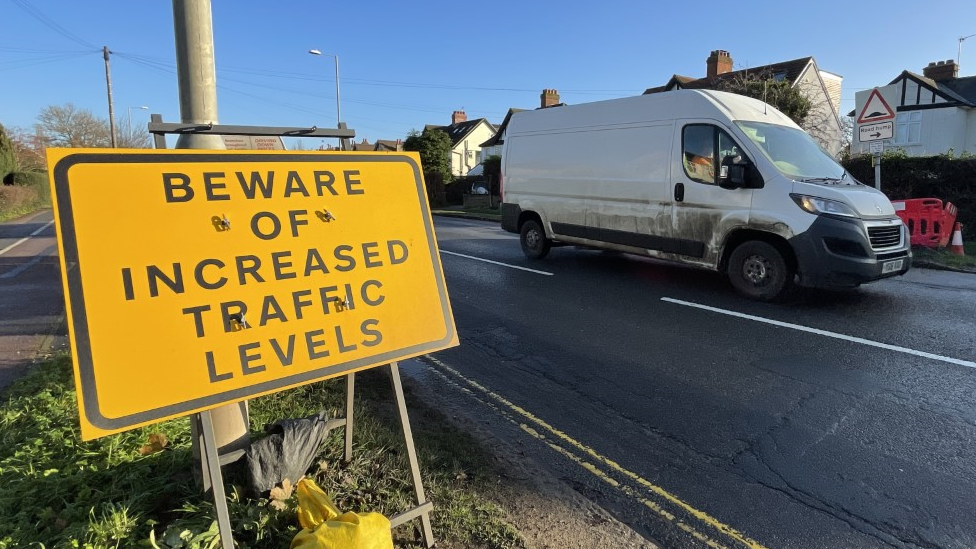
Drivers would be charged at least £5 if they drive into or around Cambridge between 07:00 and 19:00 weekdays
Cambridge is at a crossroads - trying to figure out how best to get people around.
Should it introduce a congestion charge to fund a huge expansion of the bus network, across the city and into the surrounding districts?
Those behind the plan say it will cut pollution and congestion.
But what does the data say about levels of pollution and congestion in the city - and what about its plans for growth?
What is being proposed?
The Greater Cambridge Partnership, external (GCP) - a body that includes three local councils, businesses and the University of Cambridge - has proposed what it calls a Sustainable Travel Zone, external, covering most of the city.
Vehicles that drive into it - or move around inside the zone - between 07:00 and 19:00 on weekdays will have to pay at least a £5 daily charge.
The money raised will be ringfenced and used to pay for a £50m-a-year expansion in Cambridgeshire's bus network, aiming to create a "London-style" service, as well as improving infrastructure for walking and cycling.
They say the scheme will cut carbon emissions from transport by 5%, external and "reduce pollution to provide cleaner air".
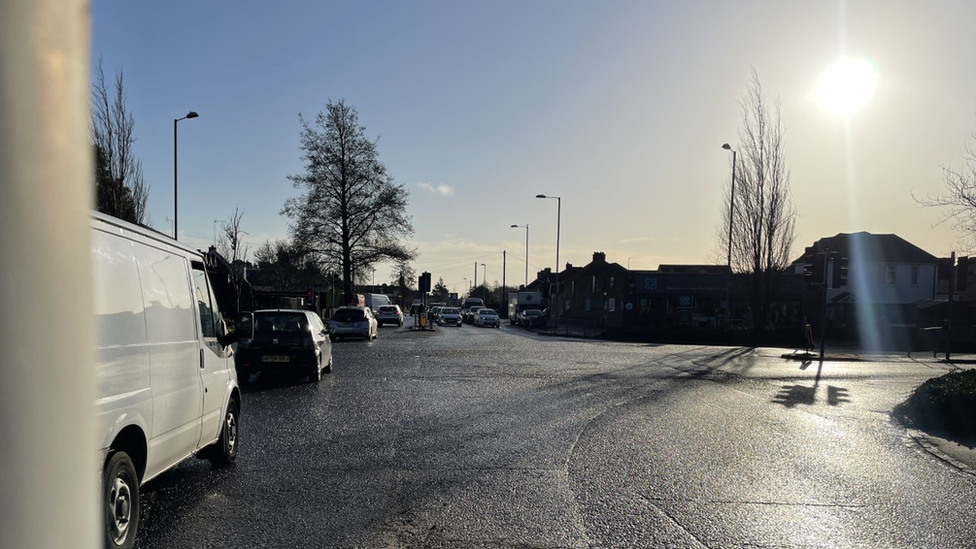
The GCP say their plans "would cut car journeys in half"
How polluted is the air in Cambridge?
Central Cambridge was declared an Air Quality Management Area, external in 2004 because of levels of nitrogen dioxide (NO2), a gas created by burning fossil fuels.
The city council monitors, external levels of NO2, as well as microscopic particles called PM10s and PM2.5s.
Those monitors show, external that over the past decade, levels of NO2 have decreased.
In 2011, the monitor on Parker Street recorded average NO2 levels of 48 micrograms per cubic metre.
Last year the same location registered 23 micrograms per cubic metre. Likewise, a monitor on Montague Road saw its average reading fall from 42 in 2011 to 18 last year.
Some of that decrease will be due to the pandemic and lockdowns. But levels had been falling before Covid hit and preliminary data from 2022 suggests NO2 levels have remained lower.
Air quality has to meet national guidelines.
The average annual NO2 level should not be more than 40 micrograms per cubic metre, external.
Hourly readings should not be higher than 200 micrograms per cubic metre more than 18 times in a single year.
Cambridge's continuous monitors have not breached either of those guidelines since 2016.
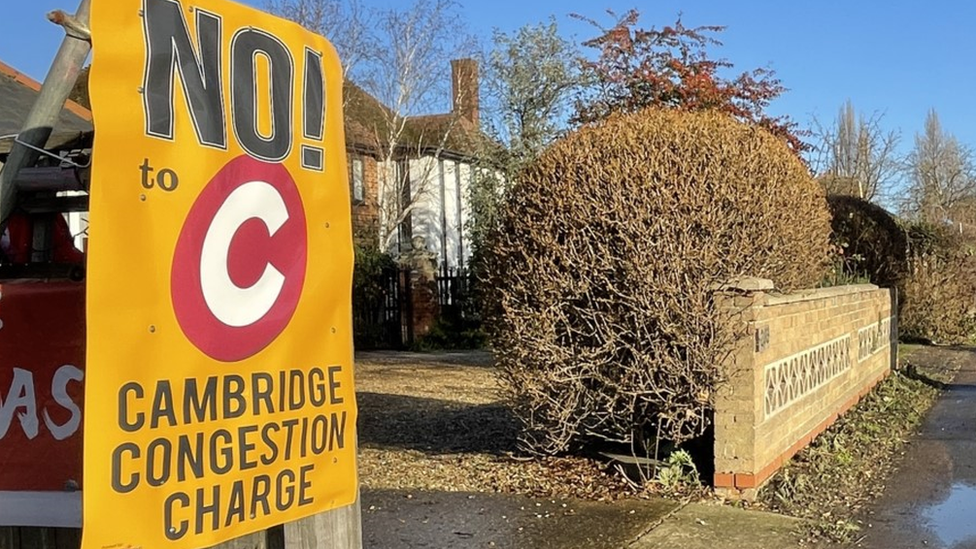
The proposals have divided Cambridge with rallies held both in support and against the plans
The GCP has also highlighted, external how, across Greater Cambridge, "121 deaths [were] attributable to air pollution in 2020".
This figure is based on published, external public health estimates that 5.9% of the mortality in Cambridge and 5.6% in South Cambridgeshire in 2020 was attributable to particulate air pollution.
The UK's Health Security Agency said that "interpreting figures of 'attributable deaths' is not straightforward".
It added: "This calculation is not understood as an estimate of the number of people whose untimely death is caused entirely by air pollution. It is more a way of representing the effect of air pollution across the whole population.
"Air pollution is considered as a contributory factor to many more individual deaths than the figure of 'attributable deaths' estimated using this approach."
You might also be interested in
But are those proportions larger than elsewhere? The East of England average was 5.8%, while Thurrock in Essex had the highest proportion at 6.5%, external.
PM2.5s also come from several sources, external, including industry, road transport and domestic burning.
City leaders say more needs to be done. In a update from September, external, council officers say air quality in Cambridge "varies".
And like 99% of the world's population, those in the city live with air that does not meet World Health Organisation guidelines, external.
The congestion charge is not just for those using petrol and diesel - drivers of electric vehicles will also be asked to pay the charge.
In a blog post, external published this week, independent city councillor Sam Davies, said the plans "are all about facilitating our area's continued rapid growth".
She added: "People might recognise pollution as a problem; but the proposed [Sustainable Travel Zone] doesn't look like it's targeting pollution because it includes low emissions vehicles such as motorbikes and electric vehicles."
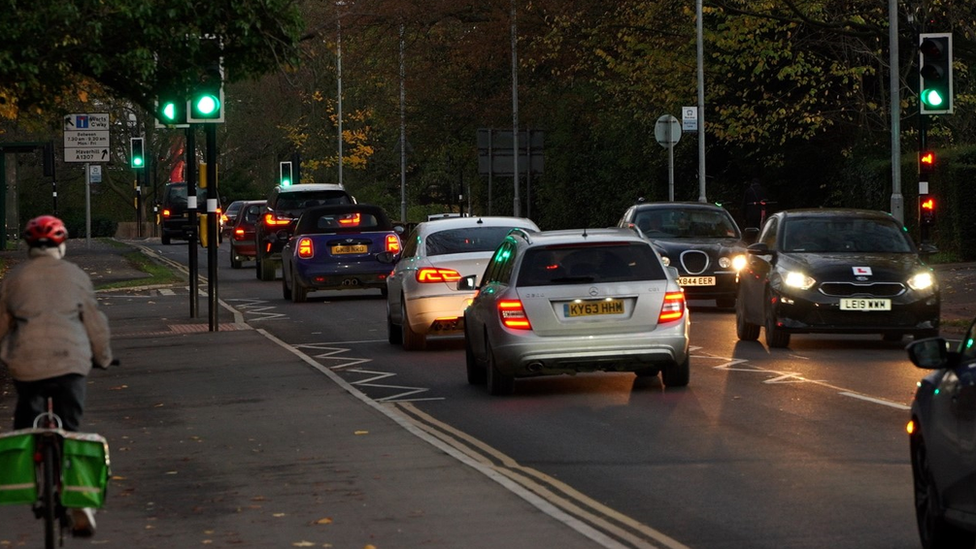
Cambridge has been ranked in the top 10 of the most congested cities in the UK once in the past five years
How congested is Cambridge?
In November, GCP chair and Cambridgeshire county councillor Elisa Meschini said, external: "Cambridge is currently one of the most congested cities in the country with a bus service that is unreliable."
The GCP's "strategic outline case, external" for the scheme says the city is "reportedly the 16th most congested city in the country".
But how does it compare to other cities?
Inrix, external, a traffic data company, produces a yearly congestion scorecard, external.
Cambridge has featured in the top 10 in the UK once in the past five years.
That was 2021, when it came second.
Inrix told the BBC that might have been because smaller cities like Cambridge saw traffic return faster after the Covid lockdowns than larger urban areas.
"During 2021, we saw smaller urban areas 'recover' in terms of traffic far quicker than their more urban, dense counterparts," the company said in a statement.
In 2019, external, a typical driver in Cambridge lost 71 hours due to congestion. In London that year, the loss was 149 hours and in Bristol, which came third in the Inrix scorecard, drivers were held up for 103 hours.
The GCP say they expect their scheme, external "would cut car journeys in half".
But John Whitelegg, external, a visiting professor at Liverpool John Moores University's School of the Built Environment, cast doubt on whether road charging could achieve such a large drop.
He said: "I'm surprised to hear the 50% figure and I think that might prove to be wildly out of line with outcome."
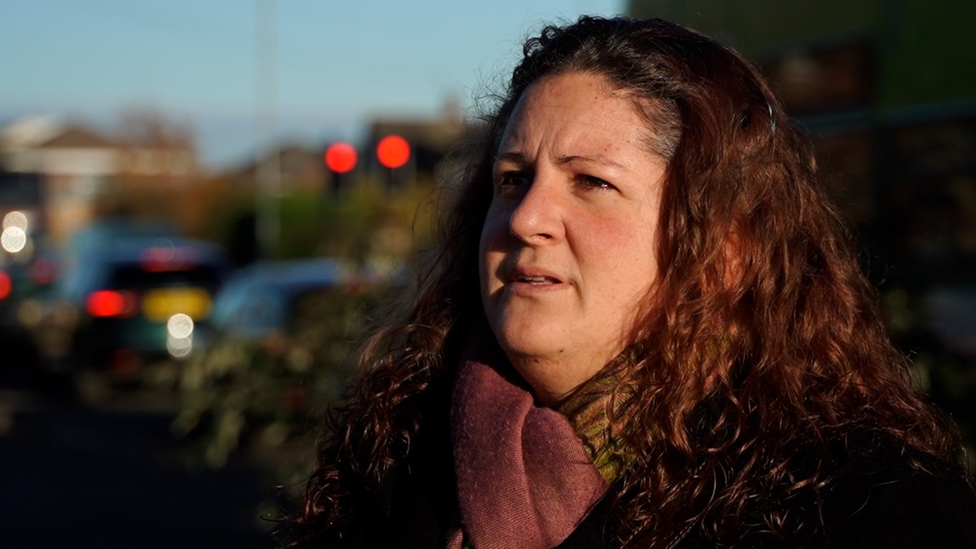
GCP chair Elisa Meschini said the city could not cope with more traffic that would come with housing and jobs growth
But what does the future hold?
Across Cambridge and South Cambridgeshire, planners are preparing, external for 44,400 new homes to be built by 2041. Another 58,500 jobs are also expected to be created in the area's economy.
Unchecked, that growth could have a significant impact on the city's levels of pollution and congestion.
Ms Meschini, a Labour councillor, external, said: "We already have 100,000 car journeys into Cambridge, we can't handle 100,000 more."
Rachel Stopard, external, the GCP's chief executive, said the weight of traffic on the region's roads means "we are choking literally and physically".
She added: "Congestion is very real - it is not imaginary, it does not stop at 09:00 or when the schools are on holiday - and it is preventing students getting to college, people getting to work or important appointments, and taking huge chunks out of people's time as they travel for their business.
"Our proposals have been developed over many years as organisations have looked at the weight of evidence and tested options at various points over the last four years through previous consultations, to put together a package that radically improves public transport and better active travel routes through a road user charge.
"The modelling tells us congestion would be greatly reduced and that in addition there would be positive benefits for air quality, carbon emissions and general well-being throughout the area.
"Cambridge would lead the way in transforming how a city can work for the benefit of its residents and visitors."
A consultation on the plans closes at midday on Friday.

Find BBC News: East of England on Facebook, external, Instagram, external and Twitter, external. If you have a story suggestion email eastofenglandnews@bbc.co.uk, external